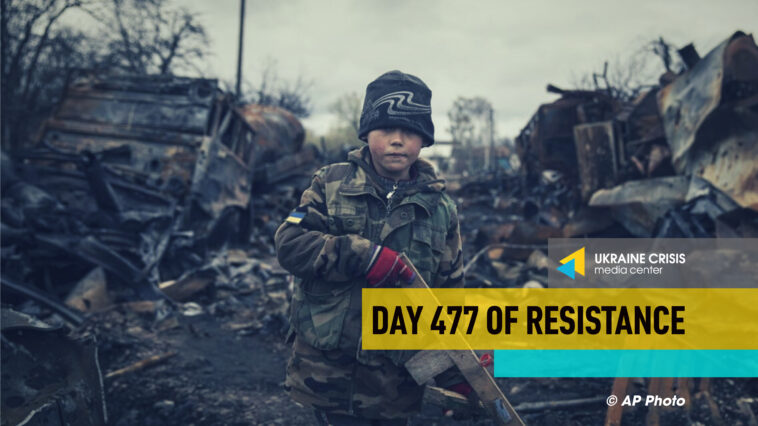Russia begins a sham trial against Azov service members, says they face “sentences” from 15 years to life in prison. Russia loses four companies in a single section of the front line as Ukrainian troops continue to advance. How war impacts young Ukrainians.
Russia holds sham trial against Azov service members, says they face “sentences” from 15 years to life in prison
More than 20 Ukrainian soldiers, members of the Azov regiment, who were taken prisoner during fighting in Ukraine, went on trial in Russia’s Rostov-on-Don on Wednesday. They face sentences ranging from 15 years to life in prison if convicted, Associated Press said.
The defendants are facing charges of involvement “in a terrorist organization and taking part in action to overthrow the Russia-backed authorities” in Donetsk region.
Of the 24 people who have faced the charges, two have been swapped for Russian prisoners of war as part of a prisoner exchange. Of the remaining 22 defendants facing the trial, eight are women, who reportedly worked as cooks for the Azov regiment.
In May 2022, Ukrainian troops were evacuated from the Azovstal steelworks in Mariupol to Russian-held areas following an arrangement that Ukrainian authorities said was made with the help of international organizations. It was said that the soldiers can come home after a prisoner swap with Russia. President Zelenskyi then said that more than 2,500 Ukrainian troops stationed at Azovstal were taken prisoner by Russia.
Russia loses four companies in single section of front line as Ukrainian troops continue to advance
In the Tavria section of the front line, Ukrainian troops continue to advance. In the past day, more than four companies of Russian forces were injured or killed, commander of the operational strategic group Tavria, Brigadier General Oleksandr Tarnavskyi said on Telegram Thursday.
Russia’s 59 pieces of military equipment were destroyed or damaged, he added. Ukrainian troops continue to advance on the Berdyansk and Bakhmut axes, the General Staff of the Ukrainian Armed Forces said. Not a single position has been lost where Ukrainian soldiers are defending.
How war impacts young Ukrainians
Cedos think tank and Info Sapiens research agency conducted a survey titled “Impact of War on Youth in Ukraine”. The poll surveyed young Ukrainians between 14- and 34-years old in the government-controlled territory (2,064 people) and Ukrainian refugees abroad (405 people). It was conducted between October 2022 and January 2023.
Eighty-two per cent of Ukrainian youth said they suffered losses of any kind following a full-scale war. The study authors note that the remaining 18 per cent might not be conscious of their losses or downplay them, comparing them with other people’s experiences.
As the survey was conducted at a time when Ukraine was experiencing rolling blackouts, half of Ukrainian youth (50 per cent) said they saw power outages, unstable Internet and mobile connection as a major problem. Young Ukrainians are most worried about a decrease or loss of income (36 per cent), deteriorating mental health (28 per cent), severed relationships with friends or family members (18 per cent), separation from family (18 per cent), relocation to other parts of Ukraine (16 per cent), death of friends or family members (14 per cent), war-damaged housing (six per cent), and suffering war-related injuries (six per cent).
A lack of money seen as a major problem in 2021, comes third (31 per cent), after health worries and rolling blackouts, the study finds. There’s been a decrease in income of the young. Forty per cent of young Ukrainians say they have not had enough money for food or can only support their basic needs — up from 23 per cent in 2021.
Top worries of young Ukrainians abroad differ. They most worry about their mental health (low mood, sadness, depression, anxiety, loneliness) – 54 per cent, health issues (personal and those of family members) – 47 per cent, lack of self-fulfillment and personal growth – 33 per cent, lack of friends and difficulties in social communication – 27 per cent.
Eighty-six per cent of young Ukrainians find “unacceptable” a scenario under which Ukraine keeps only the territories it now holds. Seventy-one per cent rejected a possibility of ending the war while Ukraine only takes back the territory it held before the full-scale invasion, excluding the occupied areas of Donetsk and Luhansk regions, and Crimea. A majority of young Ukrainians say Ukraine must restore sovereignty over the territory it held as of 2013.
A majority of young Ukrainians support the country’s accession to NATO (80 per cent) and the EU (85 per cent), an increase from 59 per cent and 57 per cent in 2021, respectively.Here’s a full article in Ukrainian.
Indonesia Peace Plan: Controversial. Ukraine in Flames #462
Indonesian Defense Minister Prabowo Subianto proposed a new peace initiative at the Shangri-La Dialogue security summit in Singapore. In his opinion, the parties must immediately stop the hostilities, withdraw their troops from the skirmish line by 15 kilometres each, create a demilitarized zone under the auspices of the UN, and hold referendums on the so-called disputed territories under the auspices of the UN. Watch Ukraine in Flames #462 to find out more about the reaction of Ukrainian, South Korean, Vietnamese, EU and other officials to this peace plan, as well as expert analysis on the reasoning behind the Indonesia proposal and vision for its possible development.
Guests:
- Evgenia Haber, Senior Fellow, Atlantic Council in Turkey
- Nataliya Plaksienko-Butyrska, Expert on East Asia, Master of Foreign Policy

